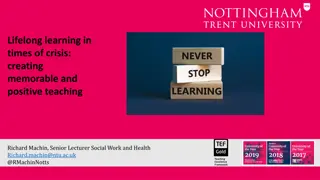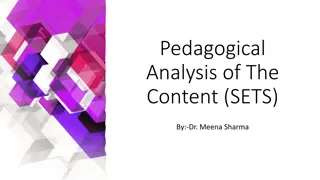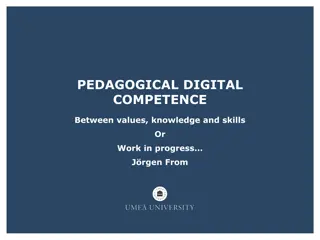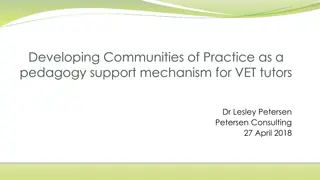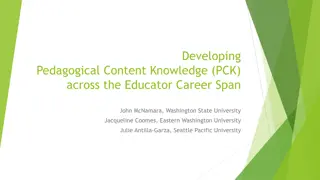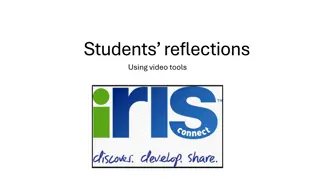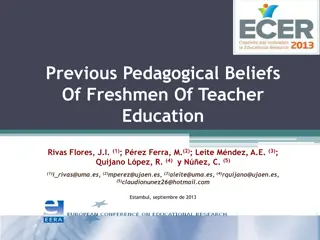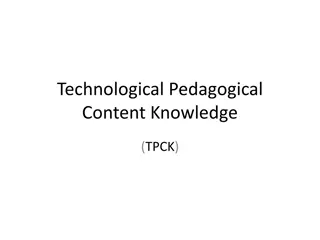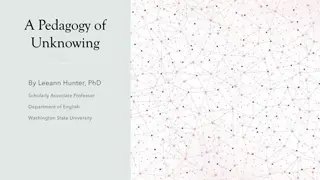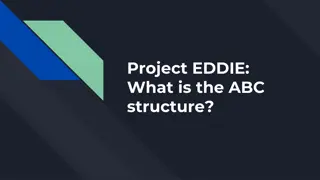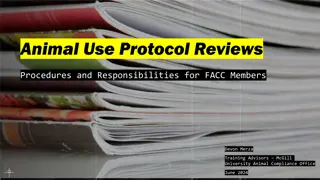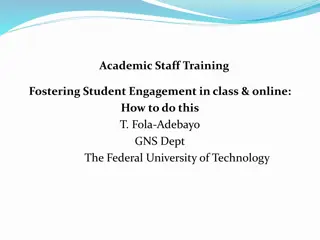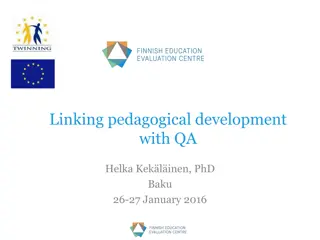System Models in Software Engineering: A Comprehensive Overview
System models play a crucial role in software engineering, aiding in understanding system functionality and communicating with customers. They include context models, behavioural models, data models, object models, and more, each offering unique perspectives on the system. Different types of system
8 views • 33 slides
Anti-Racist Education: A Comprehensive Overview
This content provides insights into Anti-Racist Education (ARE), discussing its essence, what it is not, and its pedagogical considerations. It delves into the importance of fighting systematic racism, embracing student identities, and creating inclusive classroom environments to engage meaningfully
14 views • 26 slides
Creating Resilient Graduates: Pedagogical Model for Lifelong Learning in Times of Crisis
In times of instability, educators must help students understand societal events, build resilience, skills, and emotional intelligence. This presentation by Richard Machin outlines a pedagogical model focusing on professional experience, research, and lived experience to prepare graduates for challe
6 views • 9 slides
Reimagining Blended Learning: Making Space for Transformation
Blended learning faces challenges such as overcrowded campuses and exhausted staff but can evolve through active, pedagogical spaces, stakeholder communication, and staff-student partnerships. The solution lies in creating spaces for care, reflection, experimentation, and dialogue to explore new ped
18 views • 6 slides
Pedagogical Shift in Physical Science: Constructing Knowledge Through Learner-Centered Experiences
There is a significant pedagogical shift in physical science education from viewing science as a fixed body of knowledge to emphasizing the process of constructing knowledge. Learners are now placed at the center stage, engaging in inquiry-based learning, critical thinking, and collaborative interac
4 views • 21 slides
Pedagogical Analysis of Sets in Mathematics: Key Concepts and Teaching Strategies
Explore the pedagogical analysis of SETS by Dr. Meena Sharma, focusing on major concepts like the meaning of SET, SET notation, classification of SETS, and fundamental operations. Understand minor topics such as examples of sets, SET notation methods, and types of SETS. Objectives include defining S
2 views • 8 slides
Pedagogical Digital Competence in Education
Education is evolving in the digital age, requiring teachers to develop Pedagogical Digital Competence (PDC) to enhance student learning. PDC involves applying attitudes, knowledge, and skills to plan, conduct, evaluate, and revise ICT-supported teaching effectively. It operates at three levels - mi
4 views • 9 slides
Enhancing Pedagogical Development Through Community of Practice
The research project led by Dr. Lesley Petersen of Petersen Consulting focuses on investigating the effectiveness of a Community of Practice (CoP) in developing pedagogical practices of foundation education tutors in the VET context. Utilizing participative action research and peer mentoring partner
2 views • 13 slides
Developing Pedagogical Content Knowledge (PCK) for Educator Excellence
Explore how Developing Pedagogical Content Knowledge (PCK) throughout an educator's career enhances student learning and growth. Learn strategies to integrate content knowledge, pedagogy, and socio-emotional learning effectively. Discover the progression of teacher development from recruitment to le
2 views • 29 slides
Exploring Transliteracy and Pedagogical Models in Digital Learning Environments
This content delves into the concepts of transliteracy and pedagogical models, emphasizing the importance of mapping meaning across various media in digital learning. It discusses the interconnectedness of text literacy, visual literacy, and digital literacy, highlighting the social uses of technolo
2 views • 15 slides
Promoting STEM Research Career Aspirations Through Pedagogical Practices
This study explores the impact of pedagogical practices in introductory STEM courses on students' aspirations towards research careers. It investigates the differences in effects on Underrepresented Racial Minority (URM) students and non-URM students, as well as variations in experiences within thes
3 views • 13 slides
Enhancing Pedagogical Competencies Through Video Reflection in Education
Exploring the use of video tools for student reflections in educational settings, particularly focusing on pedagogical situations. The content showcases examples of student-created videos for educational purposes, highlighting the benefits of video-based professional reflection in developing pedagog
2 views • 15 slides
Insights into Freshmen's Pedagogical Beliefs in Teacher Education
Investigating freshmen's pedagogical beliefs in teacher education, this study conducted biographical-narrative research to explore how students construct their teaching professional identity through school, social, and cultural experiences. The research focuses on knowledge acquisition, learning pro
3 views • 11 slides
Technological Pedagogical Content Knowledge (TPCK)
Technological Pedagogical Content Knowledge (TPCK) is a framework developed by Punya Mishra and Matthew J. Koehler that integrates content, pedagogy, and technology for effective teaching. TPCK emphasizes the interaction between these three key components to enhance technology integration in educati
3 views • 55 slides
Engaging Pedagogical Approaches for Student Well-Being
Navigating expertise, embracing the unknown, and supporting student resilience are key themes in the innovative pedagogical practices highlighted. The exploration dives into promoting student purpose, dismantling assumptions about expertise, and cultivating living classrooms. The emphasis on creatin
3 views • 14 slides
The ABC Structure and Pedagogical Approach in Science Education
Explore the ABC structure of inquiry-based learning – from Prescriptive to Open Inquiry, and understand the rationale behind this pedagogical approach in providing authentic disciplinary experiences to students. Overcome challenges in managing unknowns in open inquiry and discover the key elements
0 views • 12 slides
Animal Use Protocol Reviews and Responsibilities: Guidelines for FACC Members and Training Advisors
This document outlines the protocol review procedures and responsibilities for FACC members and training advisors at McGill University's Animal Compliance Office. It emphasizes the importance of scientific or pedagogical merit, alignment with guidelines and frameworks, and justification for deviatio
2 views • 22 slides
Fostering Student Engagement in Class & Online Training
Staff training plays a vital role in enhancing student engagement in both physical classrooms and online platforms. The global uptake of technology has reshaped education, leading to a surge in online enrollment. The COVID-19 pandemic accelerated the shift to online learning, highlighting the need f
3 views • 30 slides
Enhancing Teacher Wellbeing and SEL Pedagogical Practices
In educator capacity building, supporting teacher wellbeing and social-emotional learning (SEL) practices is vital. Teachers need competences in positive personal wellbeing, pedagogical skills, and the ability to evaluate SEL needs. They require training, coaching, access to resources, and a support
0 views • 6 slides
Pedagogical University of Krakow: A Hub of Academic Excellence
Situated in Krakow Academic Centre, the Pedagogical University of Krakow boasts over 75 years of tradition, offering a diverse range of study programs across multiple faculties. With a strong emphasis on research and development, the university stands out as a leading educational institution in Pola
1 views • 13 slides
Teachers of Mathematics as Pedagogical Designers Workshop at WKU
Join the Teachers of Mathematics as Pedagogical Designers workshop sponsored by RCAP at Western Kentucky University. Explore various activities, discussions, and surveys focused on enhancing pedagogical design skills in mathematics teaching. Participate in icebreakers, surveys, and engaging sessions
3 views • 26 slides
Redefining College Classroom with Avant-Garde Pedagogy
This presentation delves into innovative pedagogical approaches such as avant-garde, play-based learning, critical pedagogy, and the Ignatian pedagogical paradigm. Explore the intersection of art movements like Dada, Futurism, and Surrealism with modern teaching methodologies. Discover new perspecti
0 views • 14 slides
Redefining College Classroom with Avant-Garde Pedagogy
Redefining the college classroom through avant-garde pedagogy, exploring innovative approaches to education. Dive into the pedagogy of play, common pedagogical issues, and various artistic movements like Dada, Futurism, and Surrealism. Discover critical pedagogy, Ignatian pedagogical paradigm, and e
0 views • 9 slides
Craft of Writing Framework: Pedagogical Principles & Presentation Prep
Explore the Craft of Writing Framework, Pedagogical Principles, and Presentation Preparation for effective teaching. Learn how to utilize Arvon experiences to enhance teaching, engage students, and foster a supportive writing community.
3 views • 17 slides
Academic Reading Strategies of Chinese International Students: A Pedagogical Approach
Explore the academic reading strategies of Chinese international students through the lens of Pedagogical Content Knowledge (PCK). Learn about their language learning experiences in China and the challenges they face with overwhelming reading assignments in the US. Discover the significance of this
4 views • 44 slides
Enhancing Quality in Education: Finnish Expertise in Pedagogical Development and Evaluation
Explore how Finland's Education Evaluation Centre (FINEEC) enhances educational quality through pedagogical development and external evaluations. Learn about the latest standards and guidelines for quality assurance in European higher education, focusing on student-centered learning and teaching. Di
4 views • 20 slides
Pedagogical Conversational Agent for Educational Research Projects
Explore the development of a pedagogical conversational agent for tutoring in educational research projects by Elvis G. Ortega Ochoa. The project focuses on the student-teacher ratio in vocational training programs, addressing the lack of connection between systems and tutoring approaches. Discover
5 views • 32 slides
Enhancing Learning Analytics Through Pedagogical Maturity
Explore the significance of pedagogical maturity in advancing learning analytics within higher education, addressing the current challenges and emphasizing the need to integrate pedagogical considerations with technical aspects for sustainable impact. The discussion includes insights on maturity mod
4 views • 18 slides
Classroom Tactics Selection for Effective Pedagogical Practice
Discover the key steps in selecting classroom tactics effectively for students in pedagogical practice. Learn how to understand your class audience, diagnose their structure, and implement tailored teaching strategies for optimal engagement and productivity. Explore the importance of identifying lea
2 views • 11 slides
Understanding Early Childhood Education and Development
This work delves into the complexities of early childhood education, highlighting the potential and capabilities of young children from birth. It explores practical methods grounded in contemporary theories, showcasing the experiences of infants and the evolving pedagogical landscape. It emphasizes
1 views • 8 slides
Exploring Evaluation Concepts in Curriculum Implementation
In the context of the Curriculum of the City program, the 5th meeting focuses on understanding and sharing experiences related to evaluation practices in English language teaching. Activities include exploring myths and beliefs about assessment, discussing City Curriculum concepts, and reflecting on
0 views • 7 slides
Teaching Undergraduates About Poverty: A Vital Curriculum Enrichment
Explore innovative pedagogical techniques to bridge the knowledge gap on poverty among undergraduates. Learn about various explanations of poverty, existing undergraduate poverty programs, and the Niagara University Poverty Study's pedagogical approach.
2 views • 15 slides
Developing Pedagogical Research at School Wilhelmiina Toivo
Explore ongoing and future pedagogical research initiatives at School Wilhelmiina Toivo, focusing on projects like Masking in HE Students and Supporting ESL Students. Delve into the importance of evaluating existing projects and the need for better support strategies for diverse student groups.
3 views • 16 slides
Pedagogical Analysis of Content Sets: Understanding the Fundamentals
Explore the pedagogical analysis of the content on sets by Dr. Meena Sharma, covering topics like the meaning and definition of sets, set notation, classification of sets, and fundamental operations on sets. Students are expected to demonstrate various behavioral outcomes related to sets after learn
4 views • 8 slides
Automated Learning and Pedagogical Theories: A Comprehensive Overview
Explore the concept of automated learning, its applications, and connections to pedagogical theories like instructionism and constructivism. Discover the benefits of automation in education, including cost-savings, wide reach, instant feedback, and more.
3 views • 35 slides
Mathematics Teachers as Pedagogical Designers Workshop Agenda
Join the workshop on mathematics pedagogical design, featuring activities like parallel math tasks, lesson study planning, and task revisiting. Engage with educators in creating innovative teaching strategies and enhancing student learning outcomes. Dive into discussions, share insights, and collabo
0 views • 18 slides
Role of OER in Pedagogical Transformation at The Open University of Tanzania
Explore the role of Open Educational Resources (OER) in supporting pedagogical transformation at The Open University of Tanzania. Learn how OER empowers learners to be independent and critical thinkers, enabling them to apply acquired knowledge to solve societal challenges. Discover how OER eliminat
4 views • 12 slides
Understanding Pedagogical Models in Science Education
Explore how pedagogical models play a crucial role in science education, aiding in the process of building, using, and evaluating external representations of systems. Discover the significance of utilizing various model types to describe Earth's layers, investigate cellular respiration, and identify
3 views • 10 slides
Comparison Between Teachers and Students Perceptions of Pedagogical Content Knowledge in Biology
This study examines the perceptions of secondary school teachers and students regarding enacted pedagogical content knowledge (PCK) in biology. The research investigates the quality of teachers' PCK and its influence on student learning outcomes. Various models of PCK are discussed, and the methodol
2 views • 10 slides
Social Sciences Teaching Challenges and Strategies
Explore the complexities faced by educators teaching diversity in social sciences, including difficulties with student perspectives and pedagogical approaches. Discover how a group of concerned staff addressed these challenges through shared experiences and discussions, aiming to enhance pedagogical
0 views • 14 slides


